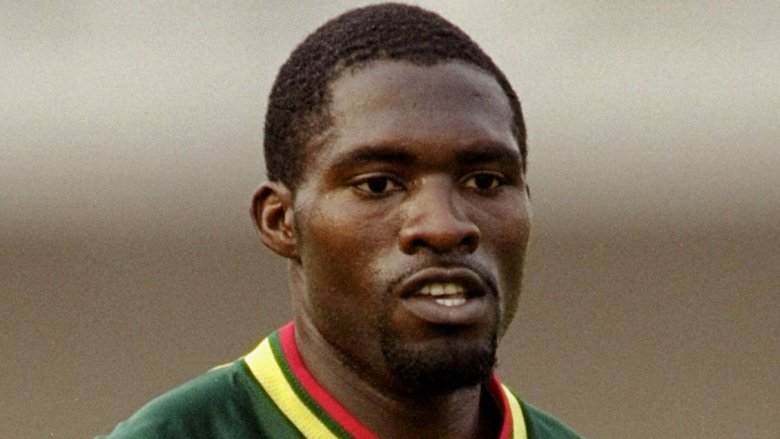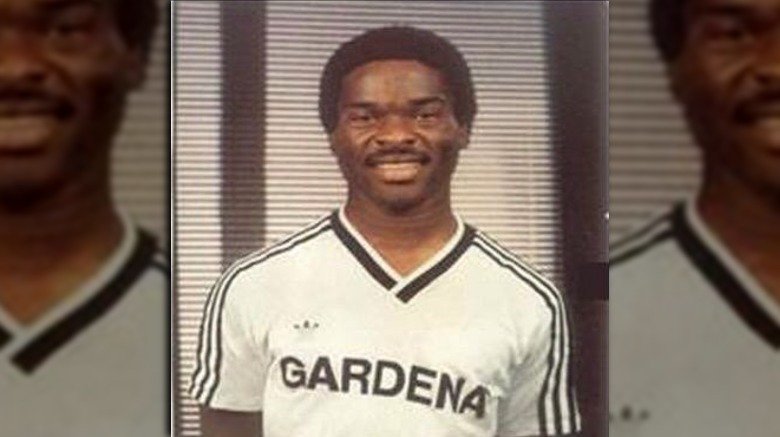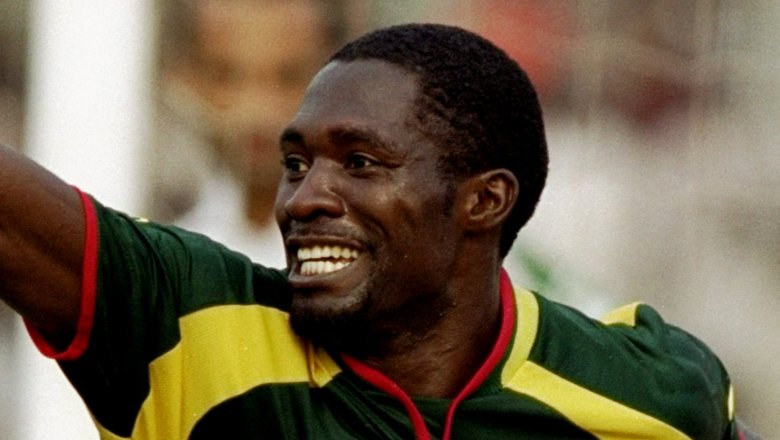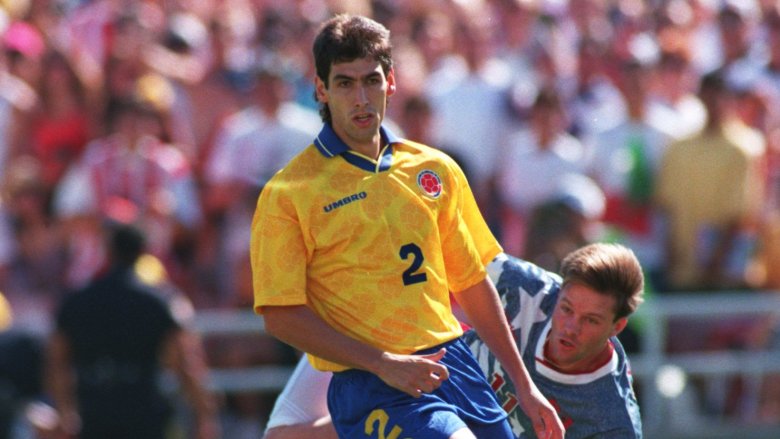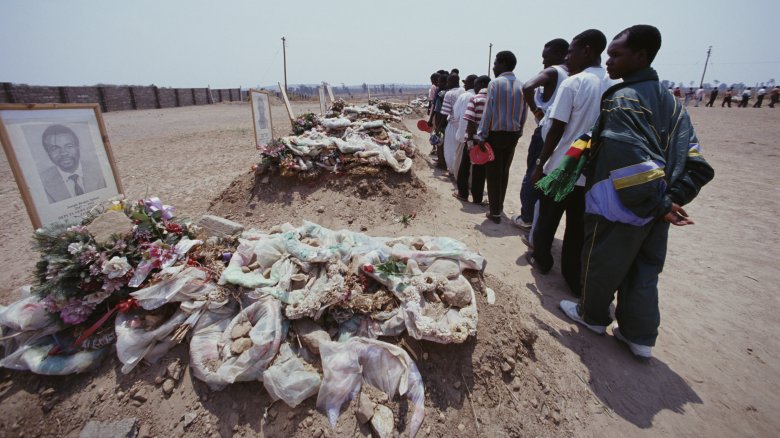Athletes Who Died In The World Cup
The FIFA World Cup is the single most popular sporting event in the world. Okay, well, technically, it's like three dozen separate sporting events, in that it's a whole bunch of soccer (or "football," if you rather) matches played by 32 countries over the course of a month, but still, more than 3 billion people around the world will watch at least part of one game.
That's because the stakes are high, all the more elevated because the World Cup is decided just once every four years. National pride, bragging rights, and sports glory are on the line, and while the quest for the championship may feel like a matter of life and death, it isn't, really. Except when it is. On a few tragic occasions over the past few decades of World Cup action, a handful of people have died in the lead-up to (or aftermath of) the World Cup ... and some right out there on the pitch.
Sam Okwaraji died, and so did Nigeria's fighting spirit
Sam Okwaraji left Nigeria for Europe to pursue a Ph.D., but he was just as gifted athletically as he was academically. He wound up playing for various European clubs throughout the 1980s and returned to Nigeria in 1988 to play for the national soccer team. In August 1989, Okwaraji and his squad, nicknamed the Green Eagles, faced Angola in a game that was part of a World Cup qualifying tournament — top finishers would go on to play for the 1990 championship in Italy. About three-quarters of the way through the game, a referee served an Angolan player with a red card, i.e., an ejection. He refused to leave the pitch, and his teammates circled the ref to protest. Meanwhile, a few feet away, Okwaraji fell to the ground in an instant. His teammates ran to his side, but the 25-year-old was already dead before he could receive medical assistance. The cause of death, witnessed by millions of Nigerians on live television, was later ruled an enlarged heart coupled with high blood pressure.
While Nigeria won that game 1-0, team member Etim Esin later said Okwaraji's death doomed them to fail in their pursuit of the 1990 World Cup. He told Goal, "We were all scared as no one wanted to fall and die." When they hit the airport to travel to the next game, Esin says four key players stayed behind. Two weeks later, Nigeria was eliminated from contention.
Marc-Vivien Foé died doing what he loved
The FIFA Confederations Cup is held every four years. Winners of the different regional and continental tournaments, with representatives from Asia, Africa, the Americas, Oceania, and Europe, compete, along with the previous World Cup winner and the host nation of the next World Cup. It's a warm-up to the World Cup that tides soccer fans over to the next World Cup, so it's commonly referred to as the "Mini World Cup."
In June 2003, Cameroon's national team reached the semifinal of the Confederations Cup for the first time, squaring off against Colombia in a match in Lyon, France. Cameroon held on to a 1-0 lead as the game wound down, when, in the 72nd minute of the match, midfielder Marc-Vivien Foé suddenly collapsed. Medical staff administered immediate assistance before removing Foé off the field by stretcher. He received mouth-to-mouth resuscitation and oxygen while medical workers tried to restart his heart for 45 minutes, but to no avail. Foé died in the stadium's medical center while his teammates and countrymen finished the game. They were celebrating in the locker room when team captain Rigobert Song tearfully delivered the news.
While the first autopsy performed on Foé was inconclusive, a second revealed he'd suffered from an undiagnosed case of hypertrophic cardiomyopathy, a heart ailment categorized by enlarged heart cell muscles that lead to a thickening of ventricle walls. Foé was only 28 years old.
Andrés Escobar made a fatal mistake
Andres Escobar didn't die on the World Cup pitch, but he might as well have. What he did during a World Cup game led directly to his own shocking and violent demise.
The United States hosted its first World Cup in 1994, but Team USA wasn't expected to advance very far, particularly because they faced international powerhouse Colombia in the opening group stage. A June 1994 match between the squads should have been nothing more than a formality ... except that's not what happened. With the score locked at 0-0 a few minutes before halftime, Colombian defender Andrés Escobar tried to block a kick into Colombia's goal, but he messed up and jerked it past the goalie. In other words, Escobar scored on his own net, giving the Americans a 1-0 lead. Final score of the game: USA 2-0 Colombia. The Colombians were eliminated from the World Cup.
Team members returned home, including Escobar to his hometown of Medellin. Less than two weeks after his on-field screwup, Escobar left a restaurant with a lady friend one night at 3:30 a.m. That's when he was approached by three men who unloaded 12 bullets into the 27-year-old soccer player. Police believe the murder was more than just a ghastly result of superfandom and nationalism run amok — some of Colombia's many powerful crime lords might have had a fortune bet on a Colombian win.
The Zambian team went down in a plane crash
The Zambian national team was probably very excited on April 28, 1993. They were on their way to play a World Cup qualifying match against Senegal, and undoubtedly expected their plane ride there to be a simple affair. Instead, according to the BBC, their craft went down in the Atlantic Ocean, killing 30 people, including 18 members of the soccer team.
It took a full ten years before an official report came out explaining what happened. There had been a perfect storm of terrible. For some reason, they were using a pilot who had just flown a long flight the day before and was very tired. And the Air Force plane the government had given the team to use was extremely faulty. So when there was a mechanical fault in the left engine, it caused a chain reaction that ended up killing a lot of people.
The exhausted pilot was alerted to the problem with the engine, but something was wrong with the indicator light bulb. Instead of turning off the faulty engine, he shut down the other one, the only one still working. When he did that, the plane lost power and crashed. The players were buried outside their stadium in Lusaka, at a place now called Heroes' Acre.
Zambians were not happy when the report was released. A lawyer for the victim's families accused the government of gross negligence. And a member of parliament demanded an apology as well as increased compensation to the families.
